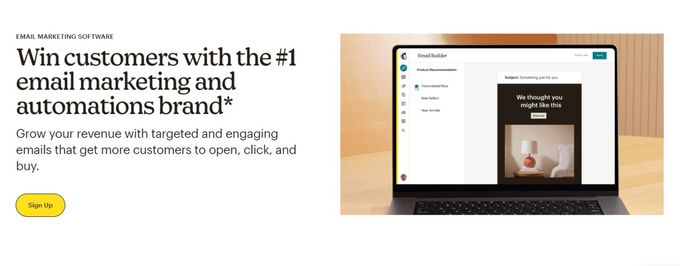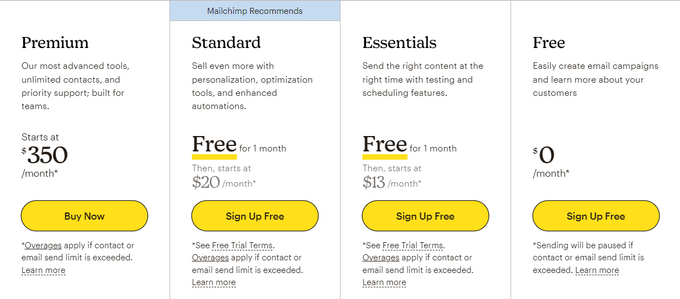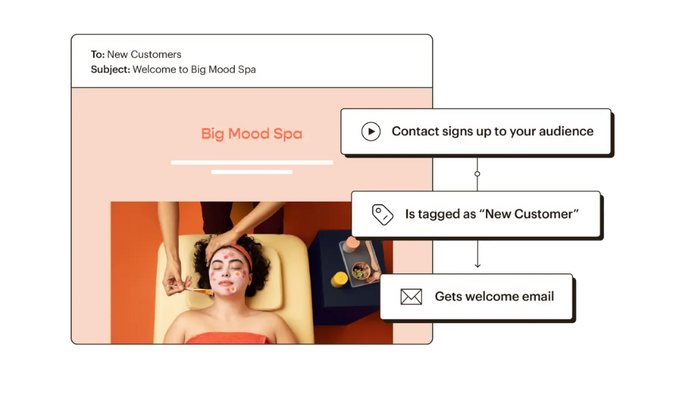MailChimp Review - Pros & Cons, Pricing, and Integrations
Updated March 10, 2023
Our team tests eCommerce apps and publishes reviews that are unbiased and not influenced by payments we receive from some of the app developers.

Mailchimp is a cloud-based email marketing service that allows businesses to create, send, and analyze email campaigns. The platform offers a range of features, including email templates, marketing automation, audience segmentation, and analytics.
According to a 2020 annual report, Mailchimp reported over 14-million current users that collectively send a mind-boggling 92 million emails a day, all of which are facilitated by their platform. But does this level of popularity mean that Mailchimp is the best option for you?
Well, that’s what we are going to explore here:
Pros
- Thorough reporting and analytics
- Easy-use-to use email and form templates
- Generous free plan
- User-friendly interface with drag-and-drop email builder
- Advanced automation features
- Advanced analytics and reporting
Cons
- Set up isn't always intuitive
- Mailchimp can suspend your account if they deem you've broken their Terms of Use
What Is MailChimp?
Mailchimp is a popular email marketing platform that enables businesses and individuals to create and send professional email campaigns to their subscribers. The platform provides a range of features to help users create effective email campaigns, including a drag-and-drop email editor, customizable templates, and automation tools.
Users can also manage their subscriber lists, track email performance, and integrate with other marketing tools and platforms. Mailchimp offers a variety of plans to accommodate businesses of different sizes and needs, and provides extensive support and resources to help users make the most of their email marketing efforts.
What is MailChimp Best for?
Mailchimp is recommended for users that:
- Are on the hunt for a newsletter service that integrates with a wide range of different tools.
- Run an e-commerce business and sell products through their email marketing campaigns. Mailchimp facilitates automated email marketing with integratable e-commerce abilities, making marketing and selling products super easy.
Mailchimp is not recommended for users that:
- Run affiliate sites or are affiliate marketers as Mailchimp prohibits affiliate marketing under its Terms of Use.
- Aren’t technically minded as the app can be painful to set up and their customer service can be rather limited.
Pricing
All of MailChimp's pricing plans are charged monthly, and they offer:
- Free plan - limited features, including 10,000 emails to 2,000 contacts/month.
- Essentials plan - costs $9.99 USD including 500-50,000 contacts/month.
- Standard plan - costs $14.99 USD including 500-100,0000 contacts/month.
- Premium plan - costs $299 USD including 10,000-200,000 contacts/month.
Integrations
Mailchimp’s integrations work with the most popular CMS platforms, plus a whole heap of other third-party applications, including:
- WordPress
- Squarespace
- Stripe
- Shopware
- Mixpanel
- Firebase
- Vimeo
- SurveyMonkey
- And a whole heap more
Features
Those that opt to use any of Mailchimp’s paid plans will have access to a whole heap of flexible and customizable email template designs. There’s a ton of choice and the templates can be customized using a drag and drop interface. The free plan does come with a few templates; although, they are a little limited in their customization and appear quite outdated.
- Email Templates: Mailchimp offers a variety of customizable email templates that allow businesses to create professional-looking emails without any coding skills.
- Audience Management: Mailchimp allows businesses to create and manage their email lists, segment them according to different criteria, and personalize emails for different audiences.
- Automation: Mailchimp's automation feature allows businesses to create email campaigns triggered by specific actions or events, such as welcoming new subscribers or sending abandoned cart reminders.
- Analytics: Mailchimp provides detailed analytics on email campaigns, including open rates, click-through rates, and engagement metrics, allowing businesses to track the success of their campaigns.
- Integrations: Mailchimp integrates with a range of third-party tools, including e-commerce platforms, social media platforms, and CRM software, allowing businesses to streamline their marketing activities across multiple channels.
- Mobile App: Mailchimp's mobile app allows businesses to manage their campaigns on the go, create and send emails, view analytics, and more.
Usability
Although Mailchimp may involve a bit of head-scratching to set up, once it is up and running the app’s ease of use quite good. Mailchimp’s clean interface, navigation, and tools are all fairly intuitive to use and simple to operate. Users can choose from pre-designed templates or create their own from scratch.
Additionally, Mailchimp offers analytics and reporting features to track the success of campaigns and identify areas for improvement. The platform also integrates with other tools such as social media, e-commerce, and CRM platforms to streamline marketing efforts. Overall, Mailchimp's usability makes it a popular choice for businesses of all sizes looking to streamline their email marketing efforts.
Support
Mailchimp’s customer support can feel rather lacking, particularly for those that are using the free plan. Although, those users that are using any of the paid plans will have access to 24/7 email, live chat, or phone support, depending on the plan of choice.
Why We Recommend It?
Mailchimp's intuitive drag-and-drop email builder makes it easy for even novice users to create visually appealing and effective email campaigns, while its advanced segmentation and personalization options allow for highly targeted and relevant messaging. The platform also offers seamless integration with Shopify, allowing for automatic syncing of customer data and purchase history.
The Bottom Line
Mailchimp is a great tool with a wide range of highly valuable integrated tools and features. And their free and premium plans are both generous and reasonably priced. Overall, we believe that Mailchimp is a top choice for Shopify store owners looking to improve their email marketing efforts and drive business growth.
MailChimp Review - Pros & Cons, Pricing, and Integrations
Recommended Reviews

PushOwl Review (2026): Pricing, Features, Integrations, & More!
Email and SMS alerts have become common marketing tools—but they have limitations. According to a benchmark report by MailChimp, e-commerce businesses have an average email open rate of only 15.68% and an average click-through rate of just 2.69%. In response to these issues, PushOwl provides a web push notification platform to help online stores engage more effectively and directly with their customers. Push notifications are clickable messages sent directly to users' devices, and PushOwl's platform enables merchants to send personalized and timely notifications based on customer behavior and preferences. This is an excellent strategy to reduce abandoned carts and boost conversions. Our PushOwl review provides an in-depth analysis of the platform's pricing, features, integrations, and more to help you decide if it's the right tool for your marketing efforts. » If you're after conversions, check out our list of top conversion rate optimization apps ProsSimple & clean dashboardTimely customer supportVisually appealing web push notificationsSupported across multiple devices & browsersIntegrates with 18 Shopify appsRobust analytics & reporting toolsConsSegmentation options are somewhat limitedReporting tools could be more customizable Best For Traders operating in highly competitive markets with a large audience will benefit most from this app. PushOwl's web push notifications provide a faster, more engaging way to communicate with customers. This is especially effective in crowded or fast-moving markets. Having said this, PushOwl's segmentation and personalization tools tailor messages and offers to specific customer segments, making the app an excellent choice for e-commerce stores of all types and sizes looking to improve sales. » Head to our best apps to boost sales list for more tools to ramp up your revenue Overview of Features Web Push Notifications PushOwl provides different types of web push notifications, including abandoned cart reminders to help you recoup lost sales by reminding your customers that they still have items in their carts. The app also provides browser abandonment notifications to help you retarget customers who have left your site without making a purchase. In addition, merchants can use flash sale notifications to promote limited-time sales and offers. There are also notifications to welcome new customers and offer discounts or incentives for their first purchase. PushOwl's triggered notifications feature allows businesses to send alerts based on specific events, like when the item is restocked or the price drops. Another advantage of using PushOwl is that notifications can be sent in multiple languages, allowing businesses to reach out to their customers in their preferred language. In addition, web push notifications do not require customers to provide an email address or download a mobile app, making communication with customers more convenient and faster. Analytics & Reporting PushOwl offers a variety of analytical tools that businesses can use to measure the performance of their campaigns. These include tracking subscribers, clicks, revenue generated, and cart recovery performance. Stores can also use PushOwl's segmentation tools to analyze campaign performance across different customer segments by location or device type. What's more, the app's email campaign reports provide an overview of campaign performance over time. These reports are valuable to businesses looking to optimize campaigns and improve targeting and segmentation by determining which campaigns are driving the most revenue or engagement. Customizable Designs The app provides visually appealing widgets that you can add to your business's website to allow customers to subscribe to push notifications. You can customize your notifications with emojis, product images, and other visual elements to make them more engaging and eye-catching and match your store's design and branding with customizable colors, logos, and other design elements. Plans & Pricing PushOwl offers a 14-day free trial so that you can try out their web push notification platform—no strings attached. Additionally, PushOwl offers a generous 60-day money-back guarantee, giving you peace of mind that you can receive a full refund if you're not satisfied with the app's performance. These are the three plans you can choose from: Basic PushOwl's Basic Plan is designed for small businesses and includes many key features to help you get started with web push notifications. This plan includes 500 monthly impressions, the ability to schedule notifications in advance, and basic analytics and reporting tools to measure campaign performance. The Basic Plan is free, so you can try it before upgrading to another one. Business Designed for growing businesses, PushOwl's Business Plan includes everything in the Basic Plan, plus advanced analytics and reporting tools like revenue tracking, conversion tracking, and audience insights. Additionally, the Business Plan offers abandoned cart reminders, shipping notifications, and subscriber details and migration. This package is $19/month for 10,000 impressions or $38/month for 20,000 impressions, so how much you pay for the app is in line with your needs. It's a great option for businesses looking to invest in more advanced web push notification campaigns to drive growth and revenue. Enterprise PushOwl's Enterprise Plan is the best choice for large enterprises with advanced needs for web push notification campaigns. This plan includes all the features of the Business Plan, plus additional customization options, Smart Delivery, browser abandonment, phone support, and a dedicated integration engineer for personalized support and guidance. Enterprise Plan pricing is available on request, customized to each company's unique needs and requirements. Integrations Third-party integrations bring great value to your online business by allowing you to connect your e-commerce platform to external software and services. These integrations help automate and streamline various tasks, such as product review request notifications, sending wishlist reminders, and sending loyalty messages to your customers. By leveraging third-party integrations, stores can improve customer experience, increase customer retention, and ultimately increase sales. The app integrates with 18 Shopify apps, including: Stamped.io: A review and rating management toolLoox: A photo-review app to build social proofJudge.me: Another review app with added SEO benefitsPageFly: A drag-and-drop page builder to create custom pagesFlits: A loyalty program app to retain customers through specialized offersNow Back In Stock: A notification app for customers to receive back-in-stock alertsAVADA: A suite of e-commerce marketing tools, including email marketing, SMS marketing, pop-ups, and more Usability PushOwl receives our stamp of approval when it comes to usability. The setup process is quick and easy, with simple steps that guide users through the notification setup and configuration process. The interface is well-designed and easy to navigate, with all the features and options you need at your fingertips. Dashboards clearly display notifications, subscribers, and performance metrics so companies can easily track progress and make informed decisions. The platform is also highly intuitive, with well-thought-out, user-friendly features for businesses of all sizes and technical capabilities. Support What also makes the app setup and implementation user-friendly is the excellent support offered by the PushOwl team. Chat support: PushOwl offers live chat support to help users quickly resolve any issues or answer questions they may have.Email support: Users can also contact PushOwl support via email for any technical or account-related queries.PushOwl Help Center: The Help Center provides users with extensive documentation and resources to help them get started with the platform and troubleshoot any issues they may encounter.Blog: The PushOwl Blog offers regular updates and insights on web push notifications, e-commerce marketing, and industry trends, providing businesses with valuable information and strategies to improve their marketing efforts.Resources: PushOwl offers a range of resources, including webinars, whitepapers, and guides, to help businesses learn more about web push notifications.YouTube Channel: Their channel includes several video tutorials on each of the app's features and dashboards.Case Studies: PushOwl features case studies from real businesses that have successfully used the platform to improve their marketing campaigns, providing valuable insights and inspiration for other stores looking to do the same. Discover how Natural Pet increased their ROI with PushOwl Push Your Marketing to the Next Level Push notifications are a highly effective marketing channel. By sending targeted and personalized messages to subscribers, stores can increase brand exposure and boost traffic to their websites. Push notifications can also help businesses engage with their audience in real time to promote products, sales, and special offers, leading to increased AOV and sales. PushOwl automates and streamlines this type of marketing strategy, making it easy for merchants to set up and send push notifications, track performance metrics, and optimize campaigns for better results. The app allows businesses to create targeted and personalized notifications to increase engagement with subscribers and improve their chances of increasing sales. » Want to take your marketing a step further? Check out these leading Shopify marketing tools

Muzaara Bing Shopping Feed for Shopify in 2026
While Google is the more popular search engine, Bing has a reasonable share of worldwide users searching for products every day. So it's worth your while to advertise your Shopify products on Bing/Microsoft Shopping feed. Muzaara Bing Shopping Feed is an app that makes it easier to tap into this market share and generate more leads. Why You Should Use Muzaara Bing Shopping Feed Easy integration Muzaara easily connects your Shopify store directly to the Microsoft Merchant Center. Create engaging ads The app helps you create visually appealing and engaging ads that will help your brand stand out from the rest of the competition. Gain new customers Attract potential customers by sharing images and product ratings of your products as well as set up marketing events like promotions. Update products and prices Muzaara does all the legwork of keeping your products and prices updated while syncing it with Microsoft Shopping in real-time. Set up shopping campaigns Use Muzaara to set up shopping campaigns, allowing you to draw attention to more than one product on the same search results page. A convenient perk is that this can even appear next to your text ads. Easy to use The app is easy to set up and sports a simple and easy-to-use interface. The process of importing your products from Shopify into your Microsoft Advertising account is intuitive and only takes a few short minutes. Cost-free Best of all, Muzaara Bing Shopping Feed is completely free to use. Why You Should Use the Microsoft Search Network With Microsoft Advertising, when you create a campaign, you automatically opt in to their owned-and-operated sites, such as Bing, and some of their partner sites, such as Yahoo and AOL. Bing is not a platform to be ignored as over 9.6 billion searches are completed each month through this search engine. Data also shows that older users prefer Bing, and it is particularly popular with higher-earning individuals who have disposable income. Bing is a cost-effective alternative to Google Ads, with less competition since most businesses focus exclusively on Google and fewer advertise on Bing. Microsoft Shopping is available in these markets: AustraliaAustriaBelgiumCanadaFranceGermanyIndiaItalyNetherlandsSpainSwedenSwitzerlandThe United KingdomThe United States Our Verdict: Should You Use Muzaara Bing Shopping Feed? Improving your online visibility is critical to the success of any e-commerce business. By advertising on Bing, you not only increase your online presence, but you're also more likely to reach an audience that your competitors are overlooking. As for ratings, Muzaara has a solid 4.3 stars on the Shopify app store and is 100% free. To see if Muzaara Bing Shopping Feed is suitable for your shop, visit their website to learn more.

Loadify—Increase Page Loading Speed for Shopify Stores
Store design is a crucial aspect of building an online Shopify store. If your pages are unappealing, difficult to navigate, or take too long to load, it's almost guaranteed to chase potential customers away and severely hurt your sales. And if you don't have coding experience and hours to spare, it's almost impossible to achieve a well-optimized website. Thankfully, with an intuitive app like Loadify: Preloader & TurboMode by Ninety9, you can achieve a custom and optimized store design without any coding experience. Read on to learn more. What Does Loadify Offer? Boosted Loading Speeds There are two different ways that Loadify can improve the loading time of your pages. Firstly, Lazyload is a website feature that prevents images and other content from loading on your page until the user scrolls to that point, limiting the resources used at any given moment. Secondly, Loadify's link prediction feature will start loading content the moment a user hovers over a link with their cursor to prepare the next page for when they click it. Animated Logos and Page Transitions Instead of scrolling endlessly through copy, Loadify offers your customers the ability to navigate your store through different page transitions that you can customize to match the style of your brand. Additionally, animate your static logo to be more eye-catching to the customer, or include one of the many available pre-selected GIFs. Numerous Integrations Without Coding Customizing and optimizing your store is as easy as choosing features from a drop-down menu and tweaking their appearance—no coding required. To make your life easier, the app even integrates with all Shopify themes, as well as numerous other store design and marketing apps. Pricing Loadify offers a 14-day free trial for all their paid plans, as well as a totally free option that includes the necessary features like 15 optimized GIFs, compatibility with all Shopify themes, and even chat support if you need help. Other than that, here's what Ninety9 offers: TurboMode $2.99/month This plan includes: Link predictionsLazyload Page Transitions $3.99/month This plan includes: Numerous slide optionsBGR color & directionFour different transition typesAnimated sounds on clickable links Custom Preloader $4.99/month This plan includes: Static logo animationsCustom size, color, and fade-out speedsCustom upload options Our Verdict: Should You Use Loadify: Preloader & TurboMode by Ninety9? Whether your store is struggling with poor loading times or unexplained bounce rates, or even if you simply want that extra boost to personalization through aesthetic animations and page transitions, you can't go wrong with an app like Loadify by Ninety9. Over a hundred other Shopify sellers have installed this app onto their store and given it a solid rating of 4.8 stars. Visit their website to learn more, or head straight over to their Shopify app store page to install the app now.




